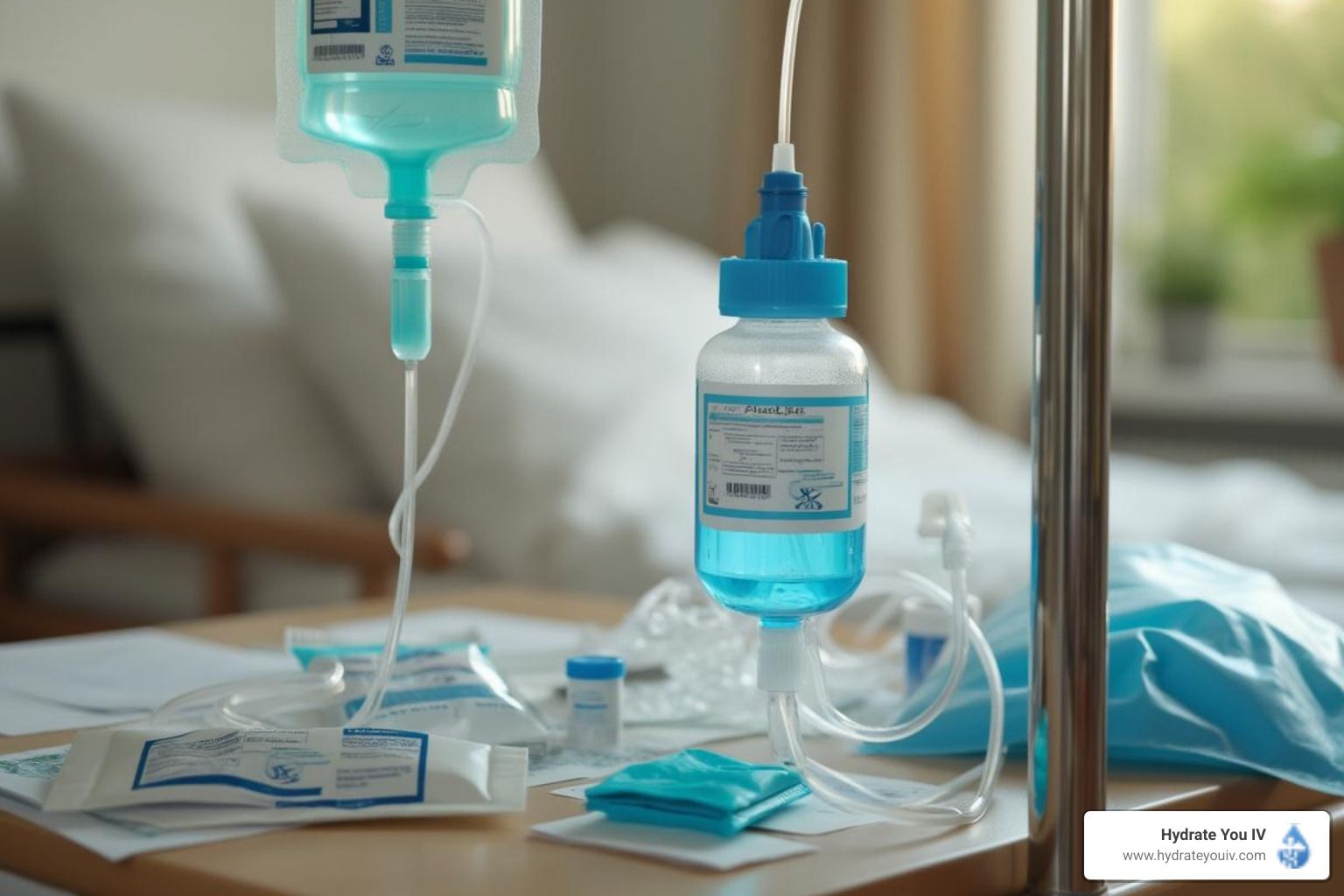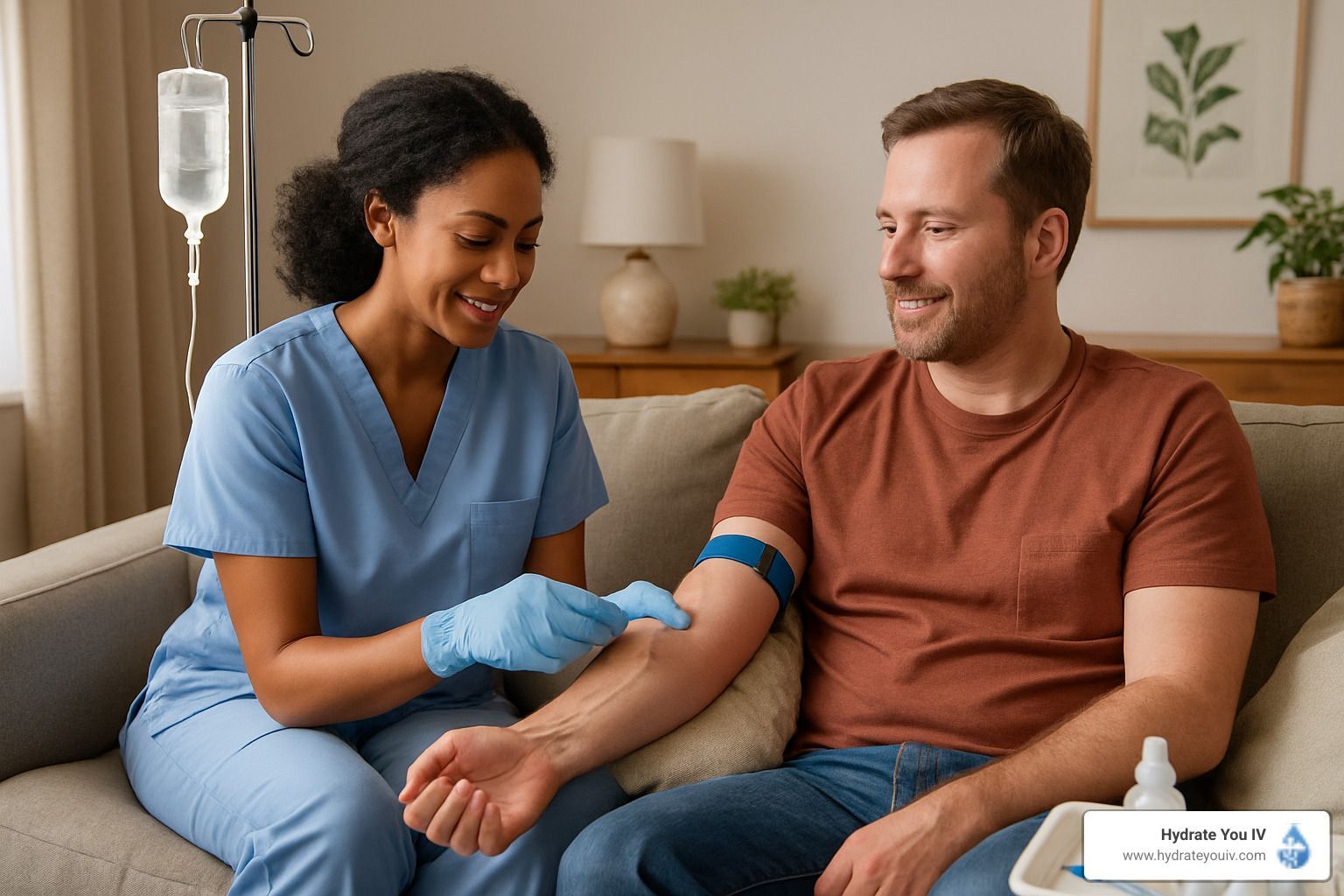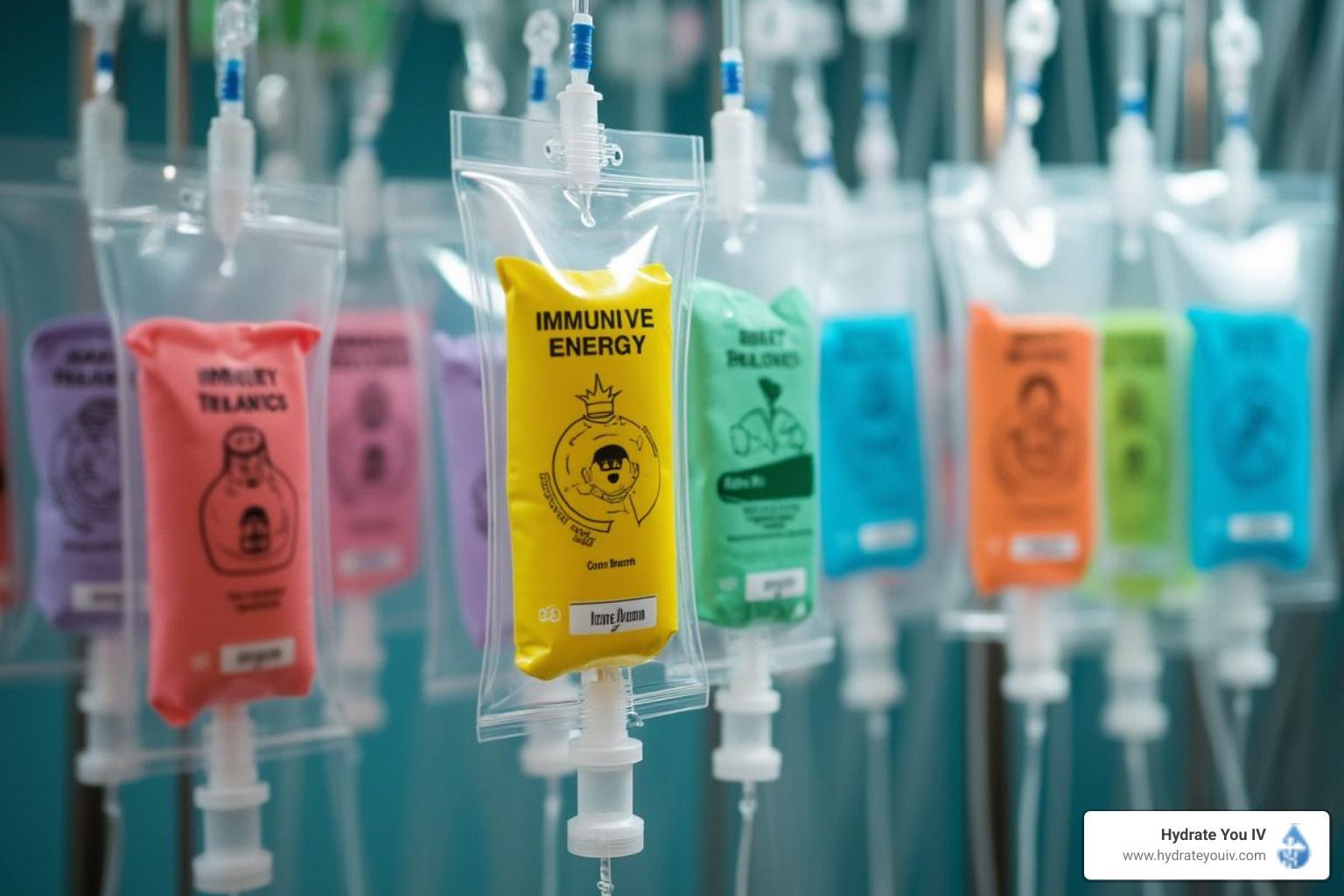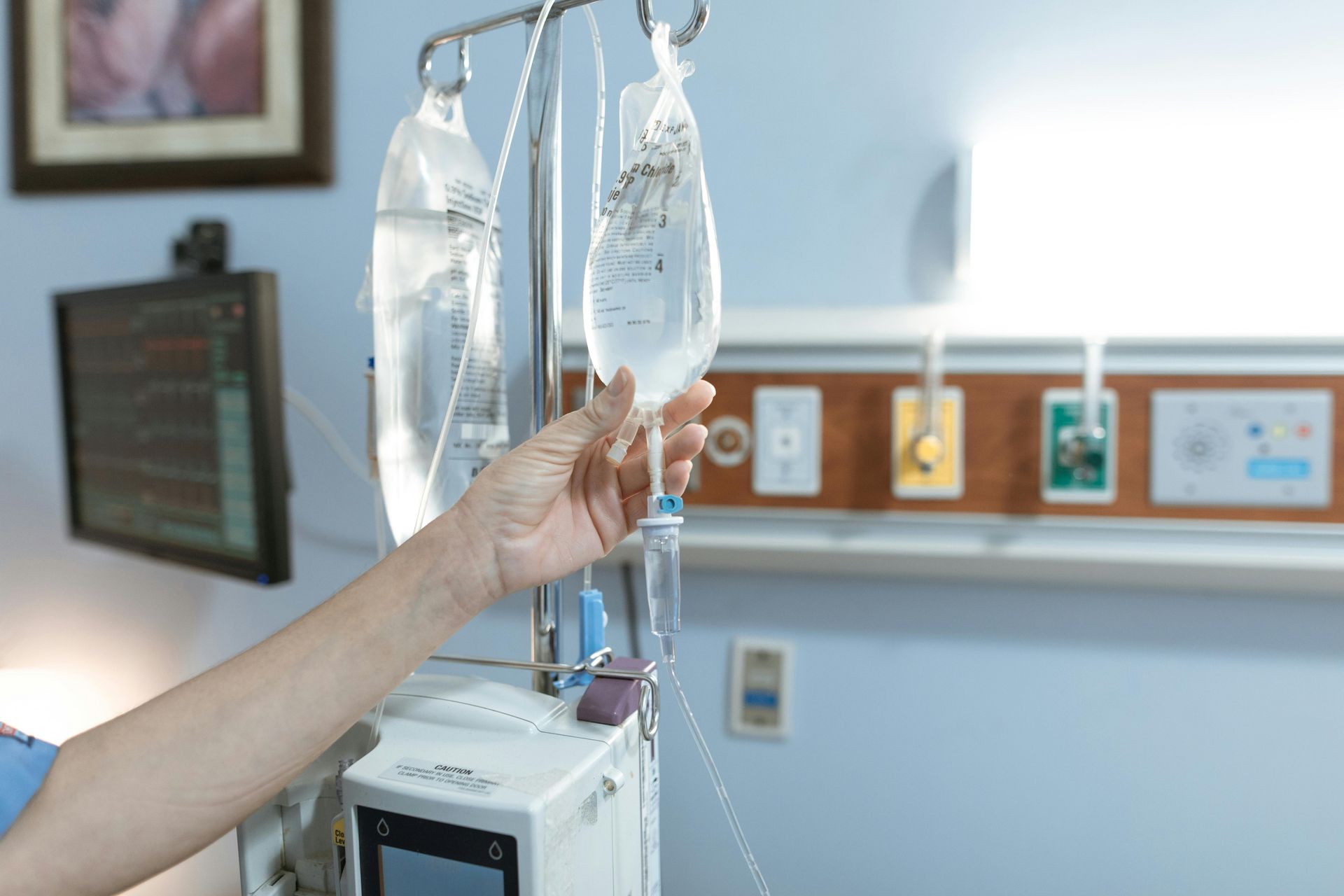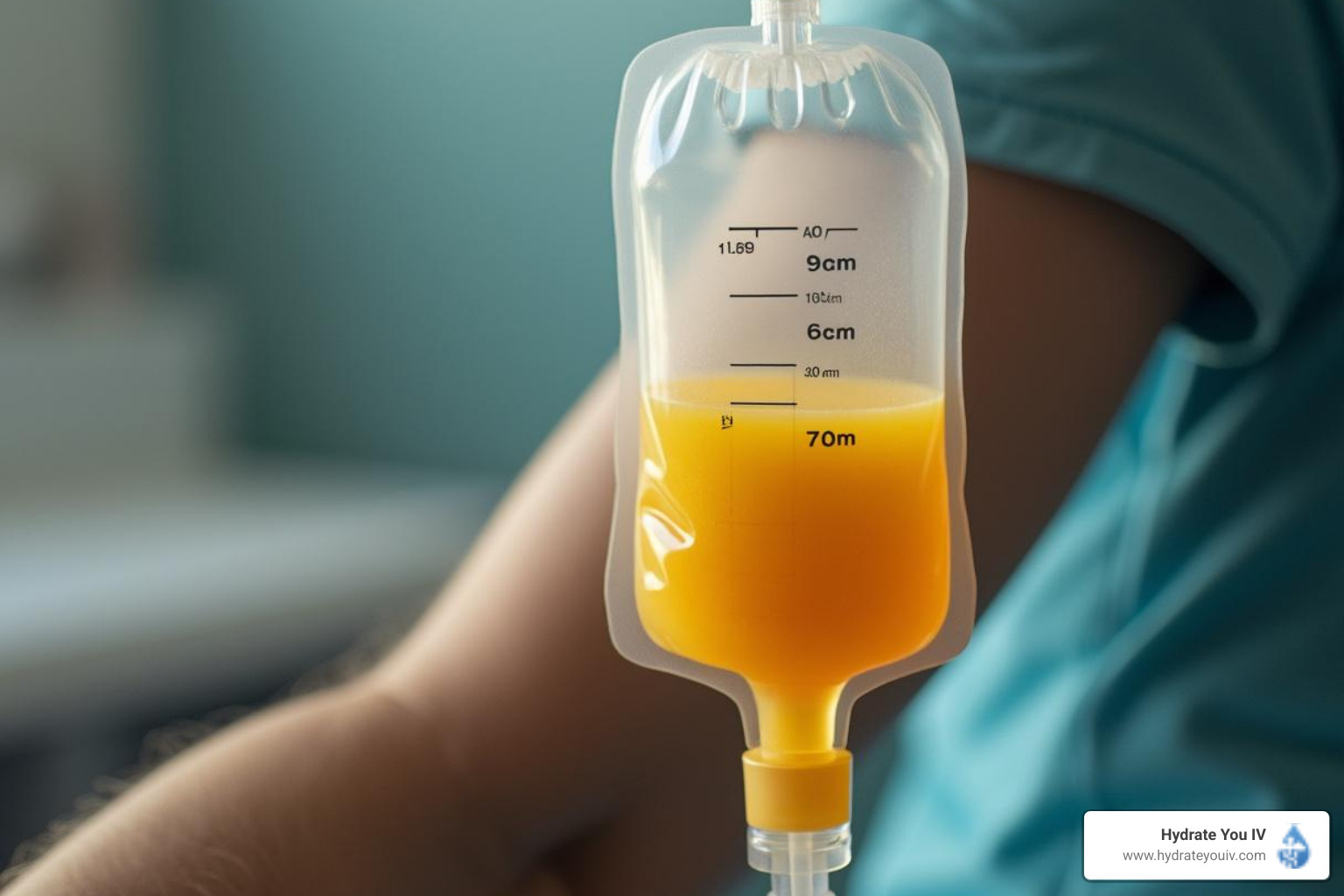Drip or Danger? A Guide to IV Hydration Therapy Safety
Is IV Hydration Therapy Safe? Let's Find Out

Many people wonder if is IV hydration therapy safe . Here's a quick look at its safety:
- Generally, yes, when done right. Licensed nurses or doctors must administer it in a clean setting. The IV fluids need to be proper and clearly listed.
- But there are risks. Unqualified staff, unclean conditions, or wrong ingredients can lead to serious issues. These include infections, allergic reactions, or even worse.
- Always check credentials and what's in your drip.
In recent years, IV hydration and vitamin therapy have soared in popularity. Celebrities and social media influencers often tout these treatments as the latest wellness must-have. They promise everything from hangover relief to an immune system boost.
This trend involves delivering fluids, vitamins, and minerals directly into your bloodstream. But with this rise in popularity, questions about safety naturally arise. Is this wellness trend truly safe? Or does it hide potential dangers? This guide will explore the benefits, risks, and what you need to know to make an informed choice.
I'm Yandree Wilson from Hydrate You IV Therapy. As a registered nurse, my expertise lies in providing safe, on-demand intravenous treatments directly to clients' homes, ensuring that is IV hydration therapy safe is always our top priority.
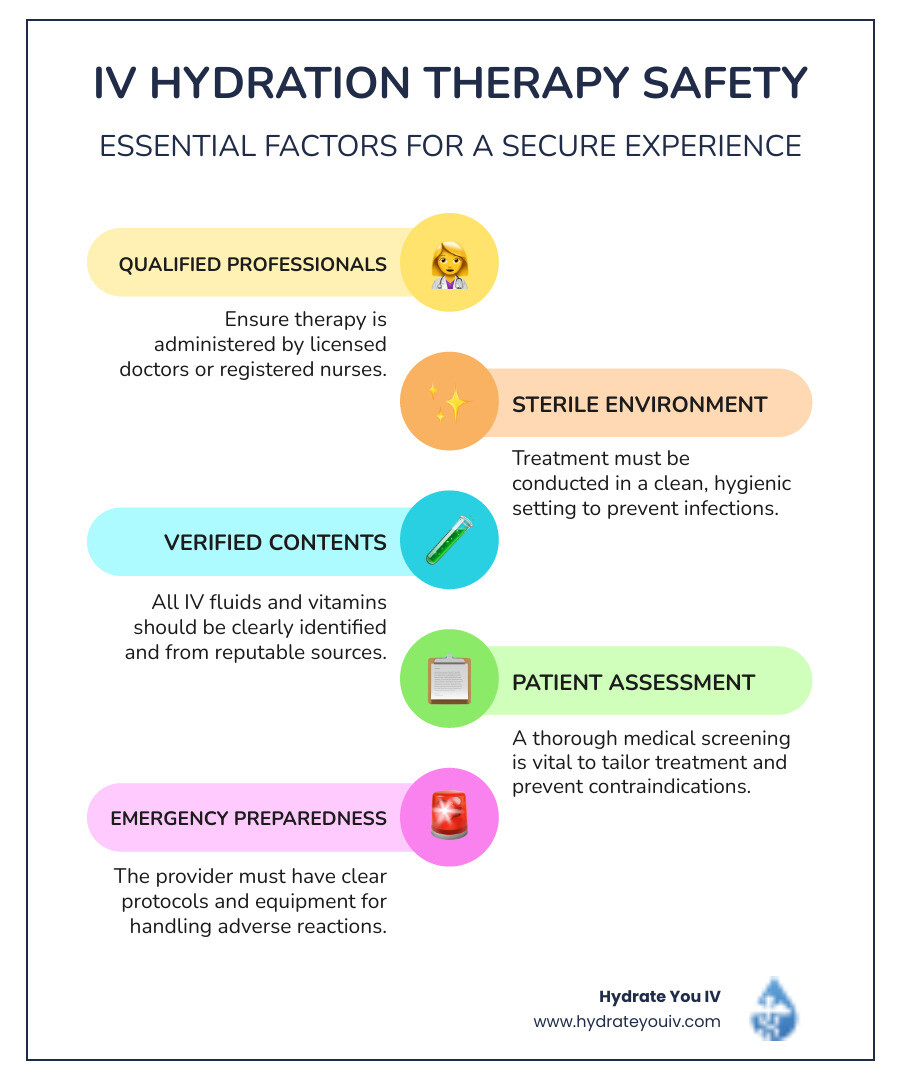
What is IV Hydration Therapy and What Are Its Purported Benefits?
So, what exactly is this IV hydration therapy everyone's buzzing about? Imagine giving your body a direct, super-efficient boost of fluids, vitamins, and minerals. That's exactly what IV therapy does! Instead of going through your digestive system, where precious nutrients can get lost or broken down, these vital substances go straight into your bloodstream. This means they get absorbed almost instantly – often close to 100%! It's why many people say they feel the effects so quickly.

While it might seem like a brand-new trend, giving fluids directly into the bloodstream has been a medical tool for a long time. It’s been used in hospitals for decades! But its use for general wellness, with special "cocktails" of vitamins, really started to take off in the 1970s. Today, it’s a popular choice for anyone looking for a quick pick-me-up.
People try IV hydration therapy for all sorts of reasons. Many swear by it for quick hangover relief , helping them feel like themselves again after a rough night. Others turn to it for immune system support , hoping to stay healthy during cold and flu season or recover faster if they do get sick. Athletes often use it for athletic performance and recovery , helping their bodies bounce back quickly after intense workouts. If you're feeling tired, some find it gives them increased energy levels and helps clear their mind. It's also fantastic for fast dehydration relief , whether from illness, heat, or just not drinking enough water throughout the day. And yes, some even seek it out for skin and beauty improvement , hoping for that "instant healthy glow" from certain vitamin mixes. Some newer places even claim it can help with detoxification or hormone balance .
For more detailed insights into what IV therapy entails, you can explore our guide on what IV therapy is.
The Difference Between IV Therapy and Oral Supplements
Now, you might be thinking, "Can't I just take a vitamin pill?" That's a great question! When you swallow a vitamin or supplement, it has to go on a long journey. First, it goes through your stomach, then your intestines, and then your liver. Along the way, a lot of those good nutrients can get lost, broken down, or simply not absorbed. We sometimes joke in the medical field that you might just be making "expensive urine," because your body can't use all of what you've taken!
IV therapy, on the other hand, completely skips that whole digestive process. By delivering nutrients right into your bloodstream, we bypass all those problems. This means almost all of the vitamins and minerals are immediately available for your cells to use. It’s like giving your body a direct shot of what it needs. While a healthy body can usually get what it needs from food, for a quick, powerful boost, many see IV therapy as a much more effective option.
To dive deeper into why this direct delivery can be more beneficial, read our article on why IV therapy can be more effective than oral supplements.
When is IV Therapy Medically Necessary?
While IV hydration therapy has become a popular wellness trend, it's super important to remember that it has a long and very serious history in medical settings. In hospitals, IVs are a basic tool. They're used to quickly give medicines, replace lost fluids, or even deliver blood when someone is very sick.
So, when is IV therapy truly medically necessary? It's essential for serious health situations. For example, if someone has severe dehydration and can't drink, perhaps from vomiting or diarrhea, IV fluids are a lifesaver to rehydrate them quickly. It's also critical for people with malabsorption syndromes , like Crohn's disease, where their bodies can't absorb nutrients properly from food; here, IV therapy ensures they get the nutrition they need. In cases of serious nutrient deficiencies that can't be fixed by eating or taking pills, IV infusions deliver what's missing. And, of course, in emergency medical treatment , getting an IV quickly allows doctors and nurses to give life-saving medications or stabilize a patient fast.
Now, for most healthy people, IV therapy for general wellness, like a hangover or feeling a bit tired, isn't usually "medically necessary." Your body typically gets all the hydration and nutrients it needs from a balanced diet and drinking enough water. Choosing to get an IV for these reasons is a personal choice. But if you are truly sick and can't keep fluids down, please remember that seeking care at a medical facility is always the best and safest option. At Hydrate You IV, we're dedicated to your well-being, and ensuring is IV hydration therapy safe for you means making informed choices about when and where to receive care.
Is IV Hydration Therapy Safe? Understanding the Potential Risks
The question of is IV hydration therapy safe is super important, especially with how popular it's become! The wellness world has really acceptd it, with med spas and hydration clinics popping up everywhere. This growth shows just how much people are looking for quick ways to feel better. Here at Hydrate You IV, we're all about safety first. But it's good for everyone to know that IV therapy is an invasive medical procedure. And like any medical treatment, there are always some potential risks.
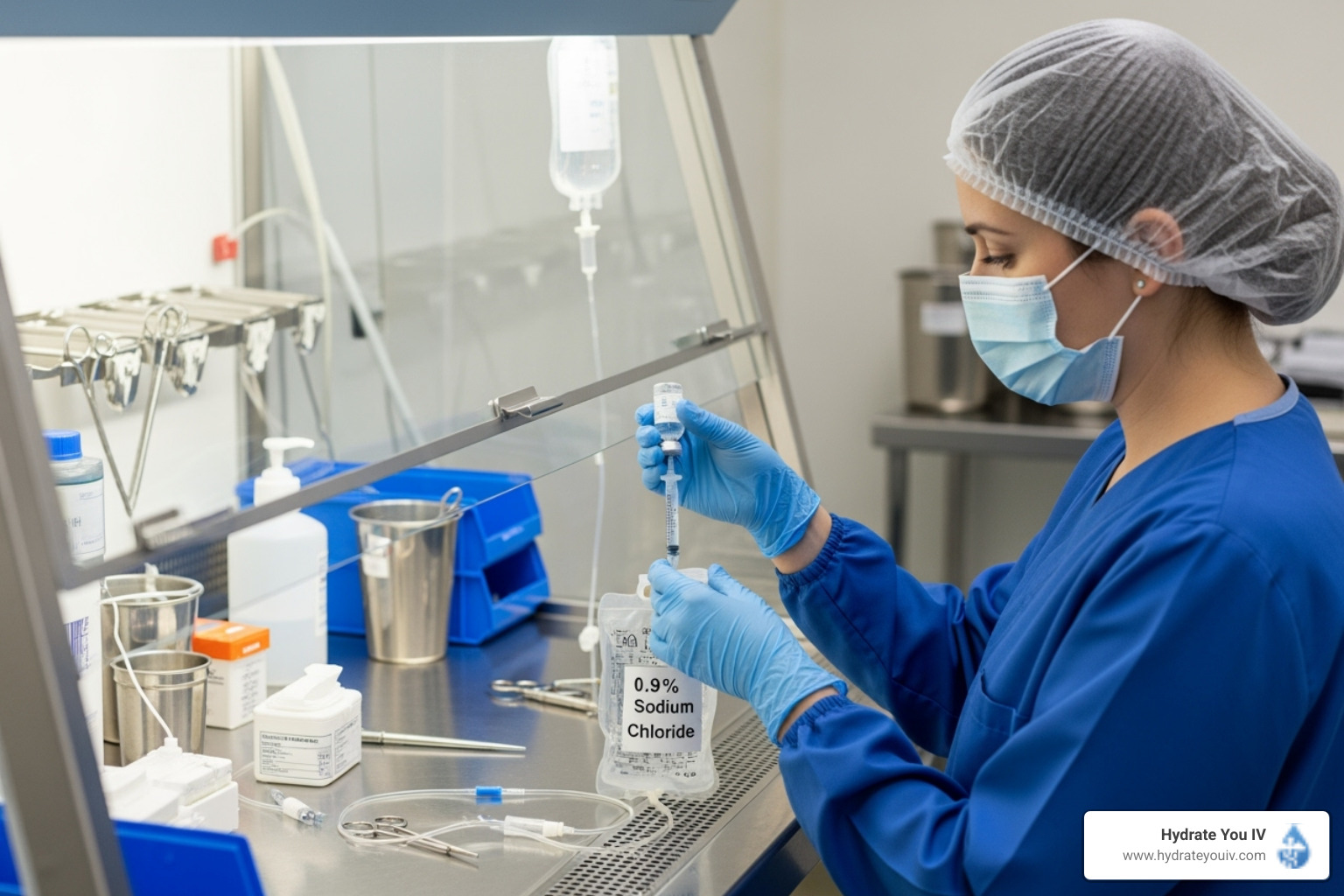
The safety of IV infusions isn't always a simple "yes" or "no." It really depends on a few key things: what's in the IV bag, how quickly it's given, and the amount used. Our biggest focus is always on making sure a trained professional gives your IV. You might have heard about the FDA even warning some IV clinics about dirty conditions or using unapproved mixes. This just goes to show why being careful and choosing a good provider is so important. If you want to learn more about the generally good things about IV therapy, you can check out the benefits of IV therapy.
Common Side Effects and Complications
Even when an IV is given perfectly, you might notice a few minor side effects. Most of these are around where the IV goes into your arm.
For example, it's pretty normal to feel a small pinch when the IV is first put in. Afterward, you might have a little soreness or bruising in that spot. Sometimes, there can be a tiny bit of bleeding when the needle goes in or comes out, but it usually stops quickly if you put a little pressure on it.
Another thing that can happen is vein inflammation , also called phlebitis. This means the vein where the IV was inserted gets a bit irritated, feeling red, swollen, or tender. It's usually mild, but can be uncomfortable. In some rare cases, it can be more serious, leading to something called superficial thrombophlebitis. You can learn more about this by looking up information on thrombophlebitis.
There's also a small risk of infection . This happens if things aren't kept super clean and sterile. If germs get into the injection site, it can cause an infection that might spread. Lastly, though it's very rare, a blood clot could form in the vein.
The good news is that these risks are generally very low, especially when your IV is given by a trained and licensed healthcare professional in a clean, sterile place. But these possibilities remind us why it's so vital to have your IV done correctly.
The Dangers of "Too Much of a Good Thing"
Our bodies are pretty amazing at keeping things balanced. When we eat or take oral supplements, our digestive system and kidneys act like natural "gatekeepers," making sure we absorb just enough nutrients and get rid of what we don't need. But when we get an IV, we bypass these gatekeepers. This means it's possible to get "too much of a good thing," which can sometimes lead to problems.
For instance, you might hear about vitamin toxicity . While many water-soluble vitamins are usually safe because your body just pees out the extra, getting very high, fast doses can sometimes overwhelm your system. For example, too much Vitamin C through an IV can, in rare cases, increase the risk of kidney stones.
Another concern is an electrolyte imbalance . Electrolytes like potassium or magnesium are vital for your body, but getting too much too quickly can mess up your body's delicate balance. This could lead to serious issues like irregular heartbeats, weak muscles, or even a dangerous overdose of potassium if not carefully watched.
For people with certain health conditions, like kidney disease or heart conditions (think high blood pressure or congestive heart failure), IV hydration can be quite risky. Their bodies might struggle to handle the sudden rush of fluids and nutrients. This could put a strain on their kidneys, lead to too much fluid in their body, or make their heart problems worse. If you have any of these conditions, you should never get IV therapy unless a doctor specifically says it's okay and is watching you.
Finally, getting too many IV treatments, or getting too much fluid, can lead to overhydration , sometimes called water intoxication. This happens when the sodium in your blood gets too diluted. It can cause symptoms like headaches, nausea, confusion, and in very serious cases, even brain swelling.
These potential dangers truly show why having a thorough health check-up before any IV therapy is so important. It ensures that the treatment is right for your body and won't accidentally cause harm.
Is IV hydration therapy safe when not administered by a professional?
The simple answer to this is a loud and clear "no!" The safety of IV hydration therapy safe depends completely on who is giving it to you. If someone who isn't properly trained and licensed tries to give you an IV, what's supposed to be a wellness boost can quickly become a serious health risk.
Here’s why having unqualified people give IVs is so dangerous:
First, there's improper administration . Putting an IV into a vein takes special training. You need to know how to find the vein correctly, keep everything sterile so no germs get in, and avoid problems like hitting a nerve or artery. Someone untrained could cause real harm.
Then there's the lack of medical knowledge . Someone unqualified won't know if IV therapy is dangerous for you because of other health issues you have (like kidney or heart problems). They also won't understand how the IV might react with other medicines you're taking. And if you have a bad reaction – anything from a mild rash to something really serious like an allergic shock – they won't know how to help you.
You also need to think about improper compounding . This means how the IV solution itself is mixed. Some places might mix up their own solutions, and these might not follow strict safety rules. The FDA has even warned about "insanitary conditions" in some clinics that mix their own drugs, which means the IV solution could be dirty or have the wrong amount of ingredients. That's a huge risk!
There have even been cases where unapproved products were used, like certain unproven fat-dissolving shots or super-strong nutrient mixes that should only be used in hospitals. These can cause very bad side effects.
Groups that regulate healthcare, like state medical and nursing boards, are very clear: IV products should only be prescribed and given by a licensed healthcare professional. They warn against getting IV vitamin therapy from untrained staff, especially in some med spas. So, when you're thinking about getting an IV, always make sure it's given by a trained professional in a safe, clean place, using sterile needles.
For more information on what's true and what's not about IV therapy, you can read our article on common myths about IV infusion therapy.
Regulation, Cost, and What to Ask Before You Drip
Alright, so we've talked about what IV hydration therapy is and the important safety considerations. But as you consider whether it's right for you, two big questions often pop up: How is this industry even regulated? And, what's it going to cost me? These are super important questions, because IV hydration can feel a bit like the Wild West sometimes, especially when it comes to consistent rules across the country.
Even though this industry has grown into a massive wellness trend, there aren't many federal rules specifically for places like med spas and IV clinics. Instead, oversight usually falls to individual states, and even then, how strictly those rules are enforced can vary a lot. This creates a kind of patchwork system, and it means you, the consumer, play a big role in your own safety!
Understanding how IV infusion therapy works is the first step towards navigating this landscape safely. You can learn more about how IV infusion therapy works.
How is the IV Hydration Industry Regulated?
The way the IV hydration industry is regulated can feel a bit like a maze, mostly because it's handled by each state, not the federal government. While most states say that a doctor or other medical professional needs to be on staff, sometimes this rule isn't very strictly followed. This can leave some pretty big gaps.
However, federal agencies aren't completely out of the picture. The US Federal Trade Commission (FTC), for instance, has stepped in when companies make deceptive and unsupported health claims about their IV vitamin and mineral drips. So, they're more focused on making sure you're not being misled by marketing, rather than directly overseeing the medical procedures.
At the state level, the responsibility usually falls to different professional boards: these include the state boards of nursing, medicine, and pharmacy . These groups are responsible for making sure the professionals giving you IV therapy are properly licensed and following the rules. They're encouraged to work together to inspect businesses and ensure everything is up to par.
Because regulation isn't always consistent, it's super important for you to verify the credentials of anyone providing IV therapy. You can often check a provider's license through your state's medical or nursing board websites. A helpful place to start is often a resource like Check a provider's license here. This way, you're empowered to do your own homework and stay safe.
What Should I Ask Before Getting an IV Drip?
Given that regulation can be a bit all over the place, knowing what questions to ask is your secret weapon for making sure is IV hydration therapy safe where you're getting it. Think of it as your personal safety checklist. Don't be shy about asking – a good, reputable provider will be happy to answer your questions and be completely transparent.
Here's what we really recommend you ask before you get an IV drip:
First, always ask who will be giving you the treatment, and what their qualifications are. Make sure they are a licensed medical professional, like a Registered Nurse (RN), Nurse Practitioner (NP), or Medical Doctor (MD/DO). It's also smart to ask about their specific experience with IVs. Then, find out if there's a licensed medical practitioner available on-site in case something unexpected happens. Even small side effects can sometimes get bigger, and having immediate medical supervision nearby is really important.
Next, you absolutely need to know what exactly is in your IV drip, and where those ingredients come from. Ask for a clear list of all the vitamins, minerals, fluids, and any medications. They should be able to explain what each part does and tell you where they get their supplies. At Hydrate You IV, we believe you should always know what you're putting into your body. Also, inquire about their sterilization procedures. You want to be sure they use sterile needles and equipment, and that the whole environment is clean and safe to prevent infections.
Don't forget to ask about their emergency protocols. Understand what they would do if you had a bad reaction. How quickly can they respond, and what steps do they take to keep you safe? Finally, ask if you can customize your treatment. A great provider will offer personalized treatments that fit your unique health needs and goals, rather than just a one-size-fits-all approach.
By asking these questions, you put yourself in charge, making an informed decision and greatly lowering any potential risks. For more insights into whether IV drip therapy is beneficial for you, explore our guide on is IV drip therapy beneficial for you?.
How much does IV therapy cost and is it covered by insurance?
One of the most common questions we hear, right after "is IV hydration therapy safe?", is about the cost. And honestly, it's a completely fair concern, because IV therapy isn't usually cheap, and for wellness purposes, it's generally not covered by your health insurance.
The price for a single IV hydration or vitamin therapy session can really vary. You might see prices anywhere from around $100 to $500 , with some very specialized or "boutique" drips costing even more. Many common drips fall in the $199 to $399 range. What makes the price change? It depends on things like the specific ingredients in the drip, how long the infusion takes, the provider's location and their business costs, and if there are any extra fees like an initial consultation. A simple hydration drip will usually be less expensive than a complex vitamin cocktail or one with special medications.
Now, about insurance coverage – this is where it gets a bit tricky. For most people looking for IV hydration for general wellness, hangovers, an energy boost, or beauty improvements, it is generally NOT covered by health insurance. Insurance companies usually only cover treatments that are considered "medically necessary" and are typically given in a hospital or clinic for specific, diagnosed conditions. Since most IV hydration clinics operate outside of this traditional medical framework, you should plan to pay for it yourself. Some providers might accept Health Savings Accounts (HSAs) or Flexible Spending Accounts (FSAs), but it's always a good idea to confirm this before you go.
Given that you'll likely be paying out-of-pocket, and the benefits for healthy individuals can sometimes be anecdotal, it's really important to weigh the financial cost against the possible benefits and any inherent medical risks. As one doctor humorously put it, for most healthy people, these treatments are "mostly harmless and really just result in people making expensive urine."
For a local perspective on pricing and options, our IV drip OKC guide provides more details.
Conclusion: Making an Informed and Safe Choice
So, is IV hydration therapy safe ? After exploring everything from celebrity endorsements to FDA warnings, the answer isn't black and white. It's more like "yes, absolutely – but only when done right."
Think of it this way: getting an IV is like inviting someone into your bloodstream. You want that someone to be a trusted professional, not just anyone with a needle and good intentions.
The benefits versus risks equation is real. We've seen how IV therapy can offer rapid hydration, quick nutrient delivery, and that coveted 100% absorption rate. For some people dealing with severe hangovers, athletic recovery, or genuine dehydration, these benefits can feel pretty amazing. But we've also uncovered the flip side – injection site complications, vitamin toxicity risks, and the serious dangers that come with unqualified providers.
The critical role of qualified professionals cannot be overstated. This isn't like getting your nails done or grabbing a smoothie. An IV insertion is a medical procedure that requires proper training, sterile technique, and the knowledge to handle complications if they arise. When a registered nurse or qualified medical professional administers your treatment in a clean environment, the safety record is quite good. When someone without proper credentials tries to do it? That's when things can go sideways fast.
The growth of this industry has been incredible – we're talking about a $15 billion wellness sector. But with rapid growth comes some growing pains, including that "underbelly" we discussed where shortcuts get taken and safety gets compromised. The lack of consistent federal regulation means the responsibility falls squarely on your shoulders as a consumer.
Our mission is to empower you to make safe choices. At Hydrate You IV, we believe you shouldn't have to choose between convenience and safety. That's exactly why we ensure every single treatment is administered by a registered nurse. No exceptions, no shortcuts.
When we come to your home, office, or hotel in Oklahoma City or Tulsa, you're getting the same level of professional care you'd expect in a medical setting – just with a lot more comfort and convenience. Plus, no travel fees means you're not paying extra for that peace of mind.
The bottom line? If you decide IV therapy is right for you, make sure it's done right. Ask the tough questions, verify credentials, and don't settle for anything less than professional administration.
For a safe and professional experience, we invite you to explore our IV treatment options.

